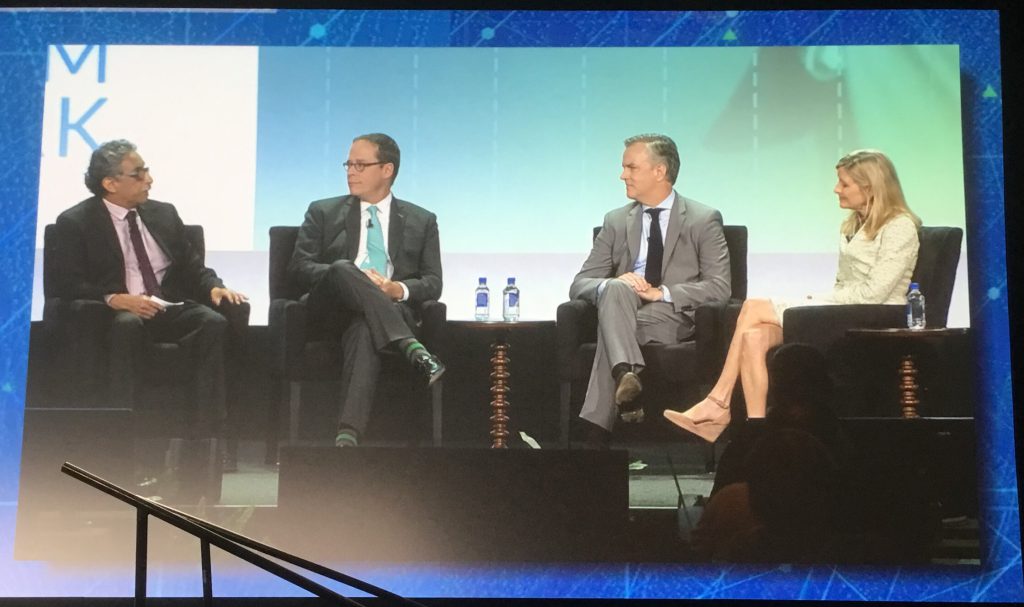Insurance Industry Challenges: View from Industry Associations
At the 2017 NCCI Annual Issues Symposium, a panel of representatives from industry associations discussed a variety of topics impacting their members. The panel included:
- Roberto Ceniceros – Senior Editor, Risk & Insurance Magazine
- Charles Chamness – President and CEO, National Association of Mutual Insurance Companies (NAMIC)
- Sean Keveligan – CEO, Insurance Information Institute (III)
- Leigh Ann Pusey – President and CEO, American Insurance Association (AIA)
What are some of the biggest issues you are monitoring right now that could impact the insurance industry?
- New regulations imposed over the years have very much inhibited the insurance industry’s ability to grow and be profitable. These changing regulations need to be monitored closely. There needs to be a cost-benefit analysis with any new regulations.
- Natural and man-made catastrophes are always a big concern. Weather is unpredictable and can lead to significant industry losses. Cyber events like the ransomware attack in the last week are disruptive.
- Are we going to get back and remove the excessive regulations that were put some companies in the insurance industry after the recession? The concern about regulation and government intervention are a concern both in the U.S. and globally.
- The current U.S. Presidential Administration has sent clear signals that they feel less regulation is important for economic growth. I am not sure that globally the mindset is the same.
- Regulators need to realize different approaches are needed with different lines of coverage. There is concern that outdated regulatory rules will stifle innovation.
Are your organizations aligned with regard to your political agendas?
- Yes and no. All three organizations work together against poor court decisions and excessive regulations. However, their memberships are different and they do not always see eye-to-eye. For example, AIA would like to see a federal role in insurance regulation because they feel that is necessary to compete in the global insurance marketplace.
- We are aligned on many issues such as the need to strengthen the federal flood insurance program and recruiting the next generation of workers into the insurance industry.
- All three groups just worked together on a lawsuit against HUD on regulations that they felt were unfair to the insurance industry.
How do the events in Washington DC impact the insurance industry? Is the optimism still there?
- Yes the optimism is still there because the stated agenda was less regulation, tax reforms and building the infrastructure. All these things would benefit the insurance industry. Unfortunately things have not started out smoothly. They are still hopeful this agenda could be pursued.
- Historically, the party in office in DC has not made a substantial impact on the profitability of the insurance industry because it is a state-regulated business.
- The flood program needs to be fixed as it is insolvent. The hope is for a private market solution backed up by a federal residual market for those uninsurable in the commercial marketplace.
- The industry is not ready for a private-market-only solution.
- A big opportunity is tax reform as most individuals and businesses feel our tax models are unfair on some level. Whether this will happen and how it will look remains to be seen.
Where do you see the workers’ compensation opt-out movement going?
- We are still concerned about it even though it has lost some momentum. It is something we are opposed to. This was being pushed by some large retailers who will continue to push this agenda.
- With rates stable-to-declining, there is less of a push for options to workers’ compensation. There is certainly less urgency.
- Workers’ compensation has withstood the test of time for over 100 years. Any “options” to workers’ compensation must provide the same core protections to employers and injured workers that are provided in workers’ compensation.
Where does TRIA stand now and where is it going?
- There was much resistance to the last renewal of TRIA, but the industry still feels it is an essential backstop that is needed to guarantee insurability of certain things in the commercial marketplace. When this comes up for renewal again before 2020, it will be difficult.
- We need to recognize that the events of 9/11 are not a typical terrorism loss exposure. We are seeing more frequency and less severity with lone-wolf attacks. Many of the employers impacted by these smaller attacks did not get terrorism coverage because they felt it was unnecessary. Declaring something a “terrorist” event is more of a political statement, but it can have policy coverage implications. The high trigger level for TRIA makes many employers feel they cannot benefit from it, so it is unnecessary.
- The industry needs to get its act together on their messaging with regard to the need for TRIA. Reinsurers say they can cover terrorism risk, but yet they want to exclude nuclear, chemical, biological and radiological losses (which cannot be excluded under workers’ compensation). Reinsurers also do not want to cover large office towers in big cities. Workers’ compensation is the best example of the need for TRIA because of reinsurance exclusions.
- We saw the commercial construction industry shut down after 9/11 in certain locations because they could not get insurance. This would be a problem again if TRIA was not renewed.
Any thoughts around healthcare and how that will end up?
- Part of what got this President and congress elected was campaigning on repeal and replacement of ACA. They have to do something to maintain credibility.
- We, in the P&C industry, have to watch out for cost shifting from the healthcare marketplace into our industry.


